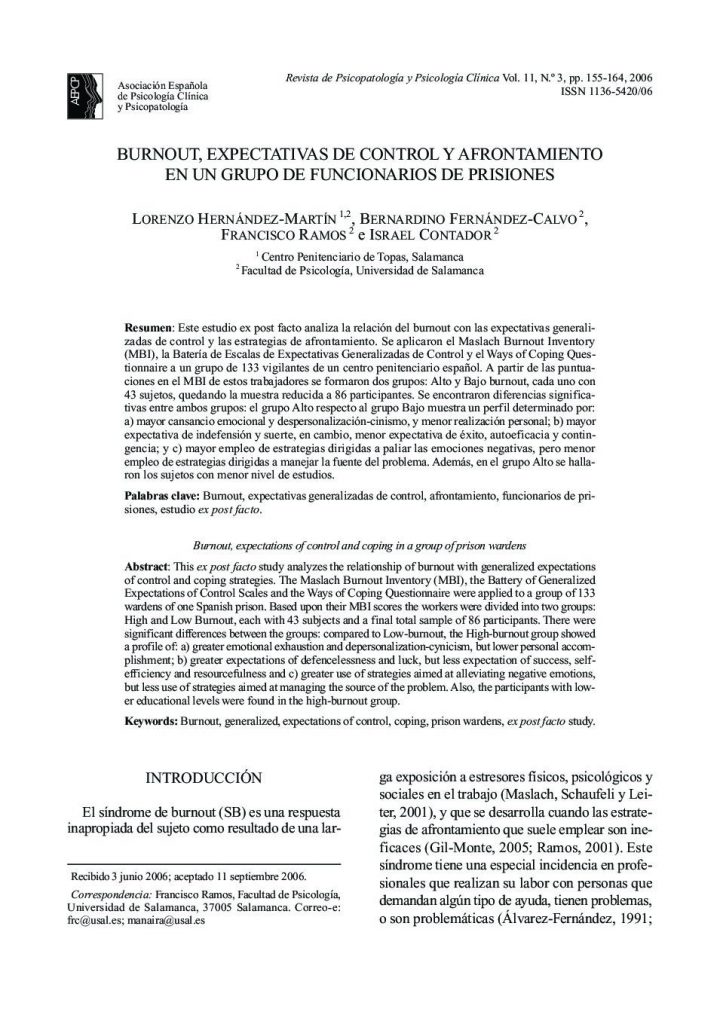Burnout, expectativas de control y afrontamiento en un grupo de funcionarios de prisiones.
Burnout, expectativas de control y afrontamiento en un grupo de funcionarios de prisiones.

- Resiliencia: Definición, características y utilidad del concepto.
- La estructura cognitiva de los trastornos de personalidad de evitación y dependiente: Un es-tudio con la técnica de rejilla.
- Burnout, expectativas de control y afrontamiento en un grupo de funcionarios de prisiones.
- Palabras de contenido paranoide en castellano: Frecuencia de uso, emocionalidad y especifi-cidad respecto a contenidos depresivos.
- Sucesos vitales estresantes y trastorno de pánico: Relación con el inicio del trastorno, la grave-dad clínica y la agorafobia.
- Información sobre criterios de calidad de la Revista de Psicopatología y Psicología Clínica
This ex post facto study analyzes the relationship of burnout with generalized expectations of control and coping strategies. The Maslach Burnout Inventory (MBI), the Battery of Generalized Expectations of Control Scales and the Ways of Coping Questionnaire were applied to a group of 133 wardens of one Spanish prison. Based upon their MBI scores the workers were divided into two groups: High and Low Burnout, each with 43 subjects and a final total sample of 86 participants. There were significant differences between the groups: compared to Low-burnout, the High-burnout group showed a profile of: a) greater emotional exhaustion and depersonalization-cynicism, but lower personal accomplish-ment; b) greater expectations of defencelessness and luck, but less expectation of success, self-efficiency and resourcefulness and c) greater use of strategies aimed at alleviating negative emotions, but less use of strategies aimed at managing the source of the problem. Also, the participants with lower educational levels were found in the high-burnout group.
Este estudio ex post facto analiza la relación del burnout con las expectativas generalizadas de con-trol y las estrategias de afrontamiento. Se aplicaron el Maslach Burnout Inventory (MBI), la Batería de Escalas de Expectativas Generalizadas de Control y el Ways of Coping Questionnaire a un grupo de 133 vigilantes de un centro penitenciario español. A partir de las puntuaciones en el MBI de estos trabajadores se formaron dos grupos: Alto y Bajo burnout, cada uno con 43 sujetos, quedando la muestra reducida a 86 participantes. Se encontraron diferencias significativas entre ambos grupos: el grupo Alto respecto al grupo Bajo muestra un perfil determinado por: a) mayor cansancio emocional y despersonalización-cinismo, y menor realización personal; b) mayor expectativa de indefensión y suerte, en cambio, menor expectativa de éxito, autoeficacia y contingencia; y c) mayor empleo de estrategias dirigidas a paliar las emociones negativas, pero menor empleo de estrategias dirigidas a manejar la fuente del problema. Además, en el grupo Alto se hallaron los sujetos con menor nivel de estudios.



